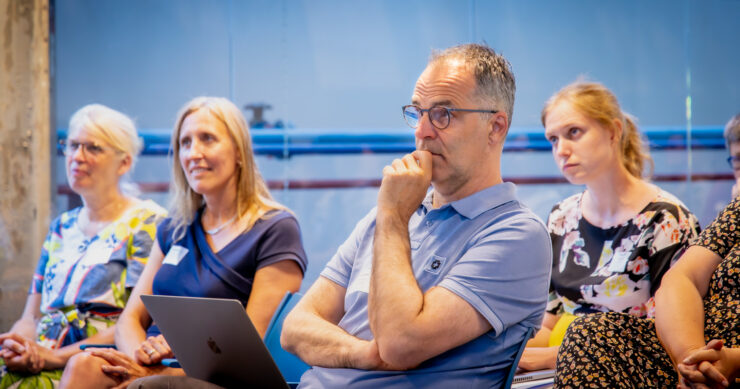
Much is expected of digital solutions to improve people’s mental and physical well-being. These solutions are indispensable in a healthcare context that is under pressure. However, developing and implementing effective healthcare technology is proving to be no easy task.
We discussed this challenge with Professor of Communication, Cognition and Computation Prof. Dr. Emiel Krahmer, from his role as leader of the Academic Collaborative Center for Digital Health & Mental Wellbeing at Tilburg University.
What is a care gap?
The Dutch healthcare sector is faced with the task of finding an answer to the rising and increasingly complex demand for care. At the same time, the available financial resources are not growing along with it and the labor market is tightening. In short: the availability of care is decreasing while demand is increasing, resulting in a care gap.
Healthcare technology, unlike the healthcare professional, is usually accessible to large groups of people 24/7. Scaling up and expanding is primarily a technical issue. This makes care technology could reduce the care gap. The Academic Collaborative Center is working on this.
Academic Collaborative Center for Digital Health & Mental Wellbeing
Tilburg University feels a responsibility to contribute to broad prosperity – prosperity that goes beyond economic growth. With four university-wide Academic Collaborative Centers, the university is building on its expertise. Characteristic of the Centers is the multi-year, interdisciplinary cooperation with companies, governments and other knowledge institutions based on a shared ambition.
One of the four centers is the Academic Collaborative Center for Digital Health & Mental Wellbeing. The goal of the Center is that by 2030 everyone can use digital technologies and interventions to work on her mental well-being and lifestyle. Several scientific disciplines and sectors, including economics, law, the social sciences and humanities, are working with the partners on an interdisciplinary basis. The partners are commercial, healthcare and nonprofit organizations, including hospitals, mental health institutions, colleges, municipalities, e-health organizations and occupational health services.
The SSH-team
Tilburg has hired nine university (lead) lecturers with the help of the SSH-sectorplan Cross-Cutting Theme. They form the SSH (Social Sciences & Humanities) team within the university and they are a recognizable unit within the Center, where they work on the ethical, legal and social aspects (ELSA) of healthcare technology in relation to (mental) health. The team also works on (econometric) effect studies, recognizing and countering medical misinformation and computational neuropsychiatry. They do this together with the total of 130 researchers involved.
Mental well-being along five thematic lines
The researchers are working along five thematic lines:
- Within the first theme, digital me, the focus is on self-direction, self-management and early support.
- Theme two focuses on working on mental health when someone is physically ill.
- Theme three deals with the effective implementation of healthcare technology.
- Theme four is about digital inclusiveness. This means that everyone, regardless of skills, education level or background, can equally participate in and benefit from digital applications.
- Theme five focuses on digital care transformation to support an overburdened system.

Can healthcare technology really relieve an overburdened healthcare system?
“Healthcare technology cannot completely replace healthcare,” argues Emiel Krahmer. “We recognise the indispensable value of interpersonal contact – and at the same time we should not underestimate the potential contribution of care technology.” A first example is the provision of hybrid treatment pathways for people with severe mental illnesses. The Center is working on a platform for people with such a condition and with whom things are progressing in a positive direction, which makes them want to scale back their care. The personalised platform helps people monitor how they are doing and what they need. With this hybrid offering, we ease the pressure on the therapist. Attention to theme three (implementation) plays a big role here: how do we ensure that people do not contact their healthcare provider more as a result of using the platform? But also, for example: what are the legal frameworks around data processing?
The applications of virtual reality
Virtual reality (VR) serves as a second example. There is growing interest in combining EMDR (Eye Movement Desensitisation and Reprocessing) therapy with VR to improve the effectiveness of trauma processing. Research shows that VR can serve both as a tool within EMDR, as well as a platform to apply EMDR elements independently. A randomised trial showed that VR-EMDR in patients with depression and childhood trauma led to improved depressive symptoms, reduced trauma symptoms and improved cognitive functions, with effects maintained up to three months later (Yan et al., 2025).
Researchers are using VR for theme one (self-direction and self-management), among others. For example, Nynke van der Laan (Tilburg University, School of Humanities and Digital Sciences) is investigating in a virtual supermarket how to encourage healthy choices. This works more effectively than large-scale research in a real supermarket. The insights can contribute to better lifestyle choices and indirectly to better mental health.
ChatGPT as a psychologist?
Krahmer’s third example of the added value of healthcare technology is about artificial intelligence (AI). More and more people are using ChatGPT’s generative AI to work on their mental health, the sparring partner who enters the conversation day and night – with no waiting list or waiting time. Theme three (implementation) also plays an important role here. Krahmer: “We know that writing and talking about your mental health helps. However, ChatGPT is a commercial company. The language model seems empathetic but does not pay attention to subtle cues.” The Workshop therefore spends a lot of time on education and knowledge sharing around the pros and cons of AI as a conversational tool. They are also exploring the possibility of developing their own generative AI chatbot, with more consideration for ethical boundaries.

Is digital healthcare effective for highly sensitive individuals?
The researchers work along the fourth theme line on digital inclusivity. One of the Centers projects focuses on exploring the role of high sensitivity in digital healthcare. People with high Sensory Processing Sensitivity process information differently. Using eye movement recording, researchers measure attention, test knowledge and map cognitive effort and fatigue in respondents watching videos or reading text. This example illustrates how researchers are working towards ‘mental well-being for everyone’.
How do we proceed?
Healthcare technology is available 24/7 and can arguably ease the pressure on care. But technology is not an end in itself. The key lies in a thoughtful, hybrid approach in which human contact and digital support reinforce each other. The Academic Collaborative Center is working with partners towards a future where mental wellbeing is accessible to all – with a focus on ethics, inclusiveness and effectiveness. In the coming years, they are committed to fundamental research, knowledge sharing, practice-based innovation and structural collaboration. They are committed to care that is not only smart, but also equitable, inclusive and meaningful.
